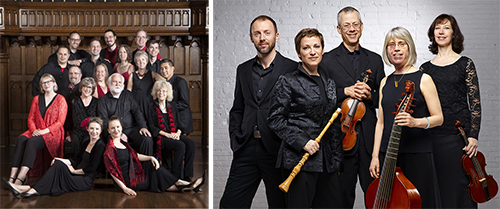by Mike Telin

On Friday, April 27 at 7:30 pm at St. Noel Church in Willoughby Hills, the two groups will come together for the first performance of “Let the Heavens Rejoice,” a showcase of celebratory psalms for 22 voices and 14 instruments conducted by Scott Metcalfe and featuring tenor Owen McIntosh, baritone Jeffrey Strauss, and sopranos Elena Mullins and Sarah Coffman. The program will be repeated on Saturday, April 28 at 8:00 pm at Lakewood Congregational Church, and on Sunday, April 29 at 4:00 pm at Plymouth Church in Shaker Heights. Tickets are available online. A free open rehearsal will be held on Wednesday, April 25 from 7:00 pm until 10:00 pm at Plymouth Church.
A joint effort between the two ensembles is a natural, as they share a common artistic goal: resurrecting forgotten music through scholarly research. “Debra is the expert on French 18th-century music,” Duffin said. “She has delved into this repertoire that Americans simply did not know much about — everyone is familiar with German, Italian, and to a certain extent English Baroque music, but French was something people were just not used to. She hasn’t done just the chestnuts. By searching manuscript archives she has found repertoire that I think none of us knew existed.”
Nagy returned the compliments. “Ross is an incredible scholar and researcher,” Nagy said. “He was extremely helpful with the translations and certain aspects of tuning.” She added that she cannot find any record of a performance of Lefebvre’s Conserva me after the 18th century. “It is my thinking that this could be a modern premiere.”
Another of Duffin’s jobs was to come up with a title for the program. “‘Let the Heavens Rejoice’ is a line from a psalm,” he said. “It’s not one that we are doing but it seemed to capture what we are trying to convey. These are celebratory psalms with a lot of instruments and voices.”
The program will include Grand Motets by Rameau and Mondonville, and Duffin noted that while Rameau’s In convertendo is very well known, the same is not true for Mondonville’s Venite exultemus. “His music was very popular in France in the middle of the 18th century, but since it was not printed — there is only a single manuscript copy of this motet — his music didn’t make it into the consciousness of people who have researched the French Baroque repertoire.”
Like Oratorio, Grand Motets are characterized by large choruses and colorful orchestral writing, and feature vocal and instrumental soloists and small ensembles. But unlike Oratorios Grand Motets do not tell a story or have a liturgical function. “In general, they are based on psalm texts, and while we think of it as sacred music, especially in the case of this program, it’s splendid, celebratory music that happen to have a text in Latin,” Nagy said. “When they were first performed as part of Low Masses at Versailles, it was just as much to celebrate the king as it was to celebrate God.”
Grand Motets also became the centerpieces for Paris’ first concert series, Le Concert Spirituel, created in 1725, and on which this program is modeled. Like all businesses at the time, the Concert Spirituel was required to register with the government and agree to honor — or find loopholes in — the restrictions imposed by state-sanctioned monopolies such as the Opéra.
“Performances could only take place when the Opéra was not in session, such as the three weeks of Lent, Pentecost, All Saints, Christmas, and all the festivals of the Virgin,” Nagy said. “And they could not perform any music in French, although they could perform music in Latin.”
Nagy pointed out that the Concert Spirituel vocal soloists were often the same vocalists who sang at the Opéra, and the music that was written for them reflects that in its virtuosity. “In the 18th-century print of Lefebvre’s Conserva me lists when it was premiered and the name of the singer. If you look up his name you will find that he sang in a lot of Rameau’s productions. So we are talking about a high-quality vocalist.”
Although Nagy has programmed some music from the Concert Spirituel in the past, this is the first time she has had the opportunity to present a program resembling one that would have been performed on that series. “They were on a grand scale and usually included two Grand Motets, maybe with brass and winds, chorus, soloists, and orchestra — they were very resplendent in that regard. The concerts were also the opportunity to introduce new and foreign music. For example, the first symphonies by Stamitz that were heard in Paris were performed there, as were the Paris symphonies of Mozart.”
Published on ClevelandClassical.com April 24, 2018.
Click here for a printable copy of this article



